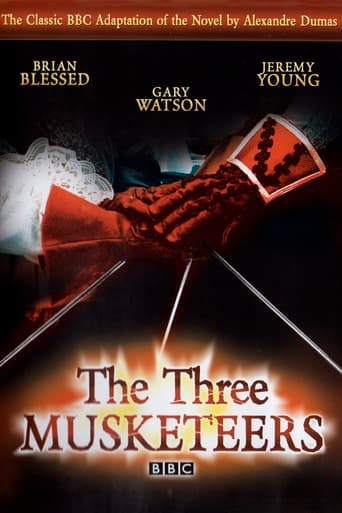anandadavidson
I have fond memories of this series when I was a child, and thought Jeremy Brett was gorgeous. Seeing it again as an adult, I was surprised at how good it still is.Some of the acting is rather hammy, particularly Anne of Austria and Constance Bonacieux, the fights seem pedestrian and some of the lighting is poor. However, given the time it was made, it is a faithful adaptation and it is unfair to compare it to modern dramas. The musketeers are all fine, and Brett is still gorgeous. Most impressive though to me is a very convincing portrayal of the melancholy and woman-hating Athos by Jeremy Young, whose performance stands out among the four friends. I recommend it as more closely following the novel than the later films. Just a shame it's in black and white.
FromBookstoFilm
I gave this a nine for faithfulness to the novel. The scenery and costumery and sets were good.No poor performances. Jeremy Brett is a fine actor and did his best in the role of D'Artagnan but alas he is no D'Artagnan.Jeremy's performances gets better as the story moves on.Brian Blessed was perfectly cast as Porthos. Mary Peach turned in an excellent performance as Milady but physically speaking against type. I really appreciate that this version includes Musketeers 4 servants and not just one and Lord de Winter,Milady's brother-in-law .This is faithful to the novel more so than Richard Lester's and George Sidney's versions which were pretty darn close as was Bernard Borderie's 1961 and the 1978 Russian version. This fine 1966 version had an equally faithful 1967 sequel called The Further Adventures of the Three Musketeers with almost the same cast as its predecessor which was based on Alexandre Dumas Three Musketeers sequel The Twenty Years After. A little Musketeer trivia to end this comment Richard Lester remade the Twenty Years After as The Return of the Musketeers in 1989 with the same cast as his Three and Four Musketeer films and the Russians also remade the Twenty Years After as Musketeers:20 Years After and followed with a version of the Man in the Iron Mask with the same cast as the 1978 D'Artagnan and the Three Musketeers. This is the Musketeer production that should be shown in a literature class.It follows the novel.
the-cullens
A nice change to see a series which keeps to the book, preserving the dark and sombre tone of the overall story as well as the comedy of the opening chapters. Given that this is a BBC series dating from the mid-sixties the quality (B & W) is surprisingly good, certainly comparable to the early Dr Who's, though the camera clearly had difficulty with the lighting in some of the outside scenes (and this is very early in the history of British TV drama to have any scenes at all shot in the open air). The fight scenes seem pedestrian until one realises that there are no special effects and the actors are performing all the action in person (no stunt men) and live (no cutting and editing; each scene had to be shot as a whole, as if on a theatre stage). D'Artagnan is fiery and emotional, 'the typical Gascon' that Dumas describes; the three musketeers themselves are exactly as I have always imagined them to be - the ascetic Aramis, the extrovert Porthos (a very young Brian Blessed) and the immensely tragic Athos; Milady is evil incarnate; and Richelieu is power-hungry, manipulative and supremely ambivalent. If you want a faithful adaptation with excellent acting and the focus on the characters then this is the one for you; if you're more interested in good visuals and special effects, CGI and Errol Flynn-type fight scenes, give it a miss.
JHC3
This 1966 BBC production is a fairly conventional adaptation of the classic Alexandre Dumas story. Content-wise, it is comparable to the better-known 1948 and 1973 versions. Whereas those films have comedic elements, this one lacks any significant humor.On its own merits, it appears to have enjoyed a respectable budget and fairly good production values. The casting of Brian Blessed as Porthos is particularly welcome. However, the performances are stiff, the fights and swordplay uninspired and unrealistic, the music and cinematography mediocre to poor. Portions of the portrayal of D'Artagnan are grating, particularly in Episode One. There is an over-reliance on dialogue, giving the film the tone of a plodding soap opera rather than a rousing adventure. When compared to the 1948 and 1973 adaptations, its weaknesses become particularly glaring. Nevertheless, dedicated fans of the Musketeers genre should probably give it a chance.


